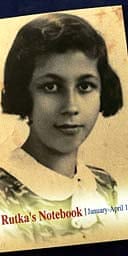A teenage Jewish girl living under the Nazis in Poland during 1943 feared she was "turning into an animal waiting to die", according to her diary, which documents the final months before her death in the Auschwitz concentration camp.
Rutka Laskier, 14, the same age as the Dutch teenager Anne Frank, wrote the 60-page diary over a four-month period in Bedzin, Poland. The diary, published by Israel's Holocaust museum, documents the steady collapse of the ghetto under the weight of the Nazi occupation and deportations, as well as the first loves, friendships and jealousies of an adolescent girl growing up during the war.
News of the concentration camps, including Auschwitz, and the brutal killings of Jews, filtered through to her.
Writing on February 5 1943, she said: "I simply can't believe that one day I will be allowed to leave this house without the yellow star. Or even that this war will end one day. If this happens I will probably lose my mind from joy.
"The little faith I used to have has been completely shattered. If God existed, he would have certainly not permitted that human beings be thrown alive into furnaces, and the heads of little toddlers be smashed with the butt of guns or be shoved into sacks and gassed to death."
Later she wrote: "The rope around us is getting tighter and tighter. I'm turning into an animal waiting to die." Her final entry is brief: "I'm very bored. The entire day I'm walking around the room. I have nothing to do."
The last entry is dated April 24 1943, at which point she hid the notebook in the basement of the house her family were living in, a building that had been confiscated by the Nazis to be part of the Bedzin ghetto. In August that year, the teenager and her family were transported to the Auschwitz concentration camp and it is thought she was killed immediately.
The diary was found after the war by Stanislawa Sapinska, a Christian whose family owned the house lived in by the Laskiers, and who had met Rutka several times during the war.
Ms Sapinska, now in her late 80s, took the diary and kept it secret for more than 60 years until one of her nephews last year convinced her to present it to Yad Vashem, Israel's national Holocaust museum and archive in Jerusalem.
"She wanted me to save the diary," Ms Sapinska told the Associated Press. "She said 'I don't know if I will survive, but I want the diary to live on, so that everyone will know what happened to the Jews'."
The diary was authenticated by Yad Vashem, which has now published it as Rutka's Notebook, in Hebrew and English. Rutka's father, Yaakov, was the only member of the family to survive the camp. He moved to Israel and had a new family. He died in 1986.
His daughter in Israel, Zahava Sherz, who has written a foreword to the diary, knew nothing about Rutka before the journal surfaced. "I was struck by this deep connection to Rutka," said Dr Sherz, 57. "I was an only child, and now I suddenly have an older sister. This black hole was suddenly filled and I immediately fell in love with her."
Diary entry from February 20 1943
"I have a feeling that I am writing for the last time. There is an Aktion [a Nazi arrest operation] in town. I'm not allowed to go out and I'm going crazy, imprisoned in my own house. For a few days, something's in the air. The town is breathlessly waiting in anticipation, and this anticipation is the worst of all. I wish it would end already! This torment; this is hell.
"I try to escape from these thoughts, of the next day, but they keep haunting me like nagging flies. If only I could say, it's over, you only die once. But I can't, because despite all these atrocities I want to live, and wait for the following day. That means waiting for Auschwitz or labour camp. I must not think about this so now I'll start writing about private matters."
